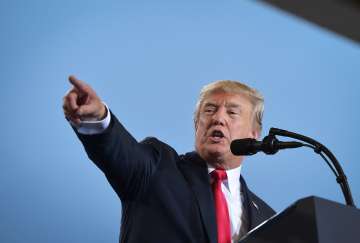No talks with Afghan Taliban, will 'finish' it, says Donald Trump
President Donald Trump has ruled out for now talks with the organisation that has unleashed a wave of carnage on Afghanistan in recent days.

Asserting the United States determination to finish off the Afghan Taliban, President Donald Trump has ruled out for now talks with the organisation that has unleashed a wave of carnage on Afghanistan in recent days.
"Innocent people are being killed left and right" by the Taliban, he told the members of the UN Security Council at a White House lunch on Monday. "Bombing in the middle of children, in the middle of families -- bombing, killing all over Afghanistan."
"So there's no talking to the Taliban,a he said. "We do not want to talk to the Taliban."
"We're going to finish what we have to finish," he said. "What nobody else has been able to finish, we're going to be able to do it."
The latest round of attacks in Kabul by the Taliban that have claimed at least 125 lives were a direct challenge to Trump, starting days after he had asserted on January 16 that the US troops had made "tremendous strides" in fighting the Islamic State (IS) and the Taliban and that the South Asia policy he had announced last August was "working far more rapidly than anybody would understand."
Taliban terrorists attacked the Intercontinental Hotel in Kabul during January 21-22, killing 22 people, including 14 foreigners.
On Saturday, they struck again with an ambulance loaded with explosives killing at least 103 people and injuring 235 others.
Meanwhile, IS killed at least four people in an attack on the outpost of a British organisation, Save the Children, in Jalalabad on Wednesday. On Monday, IS terrorists attacked a military base in Kabul, killing 11 soldiers.
Trump's statement on Monday ends for now elements of ambiguity in Washington's approach to talks with Taliban. For example, Secretary of State Rex Tillerson said last August that the US would support peace talks between the Afghan government and the Taliban without preconditions.
However, Trump left open the possibility of talks under different condition in the future.
"There may be a time, but it's going to be a long time.," he told the Security Council members. "We're all out, and that's taking place right now, and it's a whole new front."
Trump has raised the stakes in fighting the Taliban by acting against Pakistan, which he has accused of helping the terrorist organisation. The administration has announced that it is withholding security assistance to Islamabad estimated over $1 billion till it stops supporting the Taliban.
The Washington visit was organised by Permanent Representative Nikki Haley to persuade a skeptical Security Council to act against Iran, which the US alleges is violating the terms of the 2015 agreement to stop developing nuclear weapons and is fomenting trouble in the region.
She took them to a military base to show what she said were evidence of Iran's violations.
Trump had criticised the UN during his presidential campaign saying it caused problems rather than solving them and that it was a "good time" club.
Since then, he has taken a more conciliatory tone.
Despite setbacks like being criticised by the General Assembly for wanting to recognise Jerusalem as the capital of Israel and failing to get the Security Council to censure Iran over the anti-government protests and alleged nuclear activities, he has had victories.
The Security Council went along with the US in imposing the toughest sanctions on North Korea over its nuclear and missile programmes and the General Assembly has cut the UN budget for 2018 and 2019 by $285 million.
On Monday, Trump said, "My administration is proud to work with you. We've already done a tremendous number of coalition-building, and the United Nations Security Council, in particular, is very important to us."